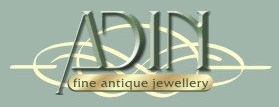Nu gespreide betaling mogelijk op het juweel van uw dromen! Vraag ons naar de details. Gratis verzekerde verzending van alle orders!
Victorian Serpent Bangle: A Circle of Mystique and Grace
Esteemed from the Late-Victorian to Belle Epoque era, circa 1880, this antique snake bangle elegantly captures the essence of both styles. Originating from Belgium, it embodies the whimsicality and romance of the period. The bangle is meticulously crafted in 18K yellow gold, featuring twelve rose-cut diamonds and two vibrant rubies. The serpent motif, a potent symbol across various cultures, here possibly conveys dual meanings of protection and temptation, reflecting both the alluring and ambivalent nature of its mythological significance.
Antique jewelry object group: bangle
Condition: very good condition
- (more info on our condition scale)
Country of origin:
Although it does not carry any legible control marks we believe this to be of Belgian origin.
Style:
something between the Late-Victorian and Belle Epoque style - Victorian decorative arts refers to the style of decorative arts during the Victorian era. The Victorian era is known for its eclectic revival and interpretation of historic styles and the
introduction of cross-cultural influences from the middle east and Asia in furniture, fittings, and Interior decoration.
Victorian design is widely viewed as having indulged in a regrettable excess of ornament.
And the Belle Époque style (Belle Époque is French for "Beautiful Era") was a period in European social history that began during the late 19th century and lasted until World War I. Occurring during the time of the French Third Republic
and the German Empire, the "Belle Époque" was named in retrospect, when it began to be considered a "golden age" the major powers of Europe, new technologies improved lives and the commercial arts adapted Renaissance and eighteenth-century styles
to modern forms. In the newly rich United States, emerging from the Panic of 1873, the comparable epoch was dubbed the Gilded Age. In the United Kingdom, this epoch overlaps the end of what is called the Victorian Era there and the period named the
Edwardian Era.
- See also: late-Victorian
or more info on styles
Style specifics:
The Late or Aesthetic Victorian Period - Experts divide the reign of Queen Victoria, also called The Victorian era (1837-1901) into three periods of about twenty years each; The Romantic Victorian Period (1837 - 1860), The Grand Victorian Period
(1860 - 1880), and the Late or Aesthetic Victorian Period (1880 - 1901).
We consider this to be of The Late or Aesthetic Victorian Period.
Jewelry of this period is changing back from heavy to more smaller, romantic pieces with often whimsical motifs. Jewelers using diamonds and bright gemstones in elaborated and fine feminine pieces.
Period: ca. 1880
- (events & facts of this era, poetry of this era,
fashion of this era)
Source of inspiration: Mother Nature
Theme:
Snakes and serpents - Serpent is a word of Latin origin (from serpens, serpentis "something that creeps, snake", deriving from the greek word "erpo" and "erpeto", crawl and serpent) that is commonly used in a specifically mythic or religious context,
signifying a snake that is to be regarded not as a mundane natural phenomenon nor as an object of scientific zoology, but as the bearer of some potent symbolic value.
The serpent is one of the oldest and most widespread mythological symbols. Considerable overlap exists in the symbolic values that serpents represent in various cultures. Some such overlap is due to the common historical ancestry of contemporary symbols.
Much of the overlap, however, is traceable to the common biological characteristics of snakes.
In some instances, serpents serve as positive symbols with whom it is possible to identify or to sympathize; in other instances, serpents serve as negative symbols, representing opponents or antagonists of figures or principles with which it is possible
to identify. Serpents also appear as ambivalent figures, neither wholly positive nor wholly negative in valence. An example of a serpent used as a positive symbol is Mucalinda, the king of snakes who shielded the Buddha from the elements as the Buddha
sat in meditation. An example of a serpent used as a negative symbol is the snake who tempted Adam and Eve in the Garden of Eden, as described in the Book of Genesis. (From:
Wikipedia)
Material: 18K yellow gold (touchstone tested)
- (more info on precious metals)
Diamond(s):
Twelve
rose cut diamonds
. We do not have the weight of the diamonds which is normal in our trade when it comes to rose cuts.
- All diamonds we offer are screened by the IJGC - lab (www.ijgc-worldwide.com
) for whether they are natural or synthetic, and all diamonds in this jewel are 100% guaranteed to be natural.
Precious stones:
Two
rubies
- It is a very common practice to treat gemstones to intensify their clarity or colour. The item in question has not been tested in this regard.
Birthstones:
Diamond is the birthstone (or month stone) for April
and ruby for July.
- (more info on birthstones)
Hallmarks: No trace.
- (more info on hallmarks)
Dimensions: inner circumference 18,50 cm (7,28 inch)
- See picture with a ruler in cm and inches
Weight: 21,50 gram (13,82 dwt)
Adin Reference Nº: 20055-0164
Copyright photography: Adin, fine antique jewellery
jewelry with snakes and serpents,
jewelry with animals,
yellow gold jewelry,
jewelry with rose cut diamonds,
jewelry with diamond,
jewelry with ruby,
latest acquisitions,
antique jewelry,
estate jewelry,
vintage jewelry or
modern jewelry
Jewelry with birthstones (or month stones) for:
January -
February -
March -
April -
May -
June -
July
August -
September -
October -
November or
December.
Additional information:
jewelry glossary -
wall of fame -
visit us in Antwerp -
subscribe to our mailinglist.
What is antique jewelry? -
What is estate jewelry? -
What is vintage jewelry?




